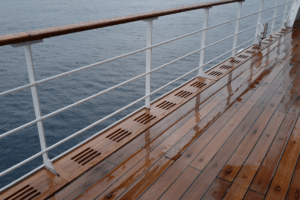With sleek surfaces and the continuous wave motions , the risk of slip and fall injuries aboard vessels is extremely high. Although slipping may seem minor when compared to other types of maritime injuries, it can actually lead to several serious injuries. To make matters worse, many slips and falls could have been prevented had the employer and/or vessel owner taken proper precautions beforehand. If a seaman is injured during a slip and fall accident because of the negligence of another party, general maritime law mandates that they have the right to be covered for their losses and injuries.

Common Causes of Maritime Slip and Fall Accidents
According to the Occupational Safety and Health Administration (OSHA), at least 43% of reported maritime injuries are a result of slip and fall accidents. In general, the most common reasons for these types of injuries include:
- Slippery, slick surfaces
- Loose lines and cargo
- Unmarked obstructions
- Lack of guardrails, barriers, or safety nets
- Equipment that was improperly secured
- Inadequate lighting
- Improper vessel planning, including high points lacking safety guards, loose ladders, and improper angles and inclines for stairs and stairways
- Insufficient safety training
- Lack of non-skid paint and/or non-skid surfaces
- Failure to establish proper housekeeping procedures aboard the vessel
The majority of these causes could have easily been prevented with the proper safety measures, better training, and better equipment maintenance. The unfortunate fact, however, is that some companies and employers tend to cut corners in areas of safety in order to save money, which leads to injuries that should have never happened.
Common Injuries from Maritime Slip and Fall Accidents
When a slip and fall accident occurs in a maritime setting, serious injuries usually follow. Unlike slipping on a dry floor on land, when someone slips on a vessel, not only do they slip on a slick surface, but also around numerous hazardous materials and equipment and cargo. The most common injuries sustained after a maritime slip and fall include:
- Sprains on the ankles and//or wrists
- Torn ligaments
- Knee injuries
- Head, back, neck, and shoulder injuries
- Traumatic brain injuries
- Severe concussions
- Spinal cord injuries
Slip and Fall Accident Leads to Paralysis
In the best situations, it’s hopeful that a slip and fall accident will only result in minor sprains. Unfortunately, this is not always the case, as noted in a 2009 accident involving a passenger on Carnival Cruise Line’s ship, the “Carnival Pride.” While aboard the ship, Denise Kaba slipped and fell on the ship’s pool deck area. Although it’s expected that pool decks come with the risk of slipping, the problem occurred when investigators determined that a slippery resin was used on the pool deck. Several prior accidents had already been reported to Carnival regarding the unsafe resin surface, yet nothing was done to prevent future accidents. In this incident however, Ms. Kaba’s accident resulted in serious, life-threatening injuries, including a fractured patella and two total knee replacements. In 2011, Ms. Kaba was awarded $2.998 million for her injuries.
In another slip and fall accident, a cook working aboard a ship that was navigating near the Gulf of Mexico slipped while walking across a slippery, unsafe deck. He hit his spine against the ship’s railing as he fell down. His injuries were so severe that he now lives with paralysis below the waist. Consequently, the cook filed suit against his employer after it was determined the deck didn’t have the required non-skid surface. Under 46 U.S.C. § 688 of the Jones Act, seamen must be afforded a safe working area at times. If this law is violated, the seaman has the legal right to file for damages for employer negligence and failure to maintain safe working conditions.
Legal Rights to Damages After Maritime Slip and Fall Injuries
Maritime employers have the legal obligation and duty to provide their employees with a safe working environment on a seaworthy vessel. In addition, proper safety training and procedures must be provided. When these important details are neglected and in turn, injuries occur, maritime workers are protected under the Jones Act and general maritime law. Under these laws, workers are entitled to damages for:
- Medical care
- Maintenance and cure
- Lost wages, which include past and future wages
- Rehabilitation and therapy
- Punitive damages
- Physical pain and suffering
- Mental and emotional anguish (PTSD, depression, etc.)
For safety information and details regarding slip and falls in the workplace, refer to the Occupational Safety and Health Administration’s “Safety and Health Topics.”